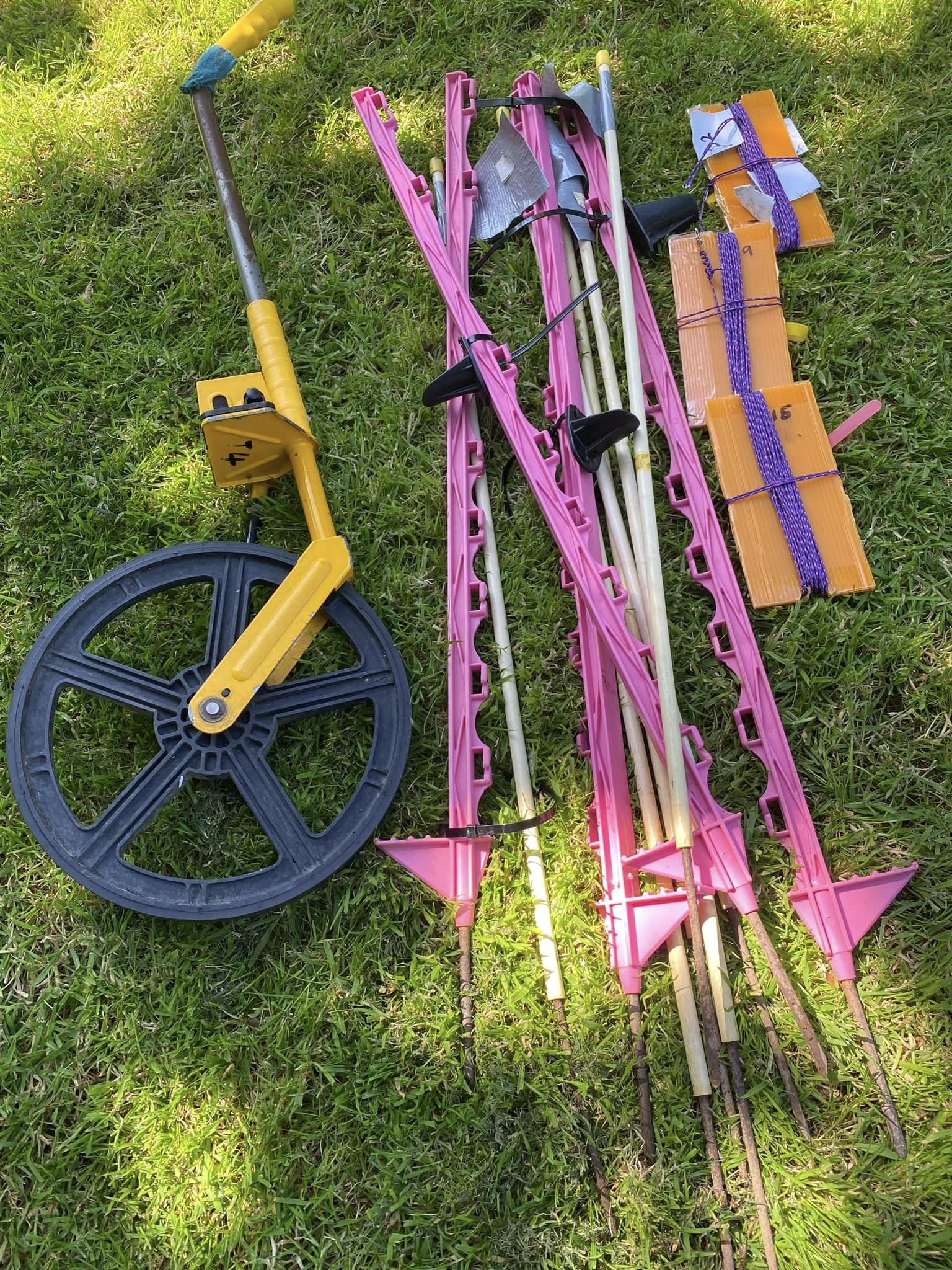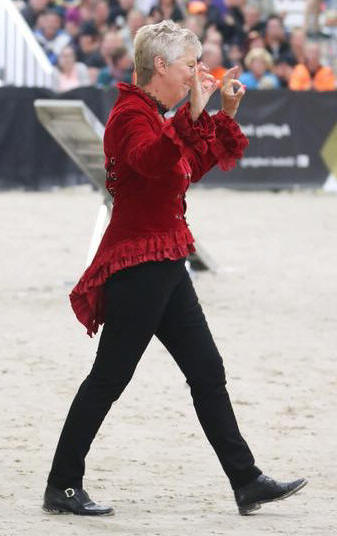A constructive
suggestion...
 As
Sally Jones, Kennel Club and international judge, was working her way through
course designs for her upcoming appointments, she started thinking about the
state of judging today and what could be done to improve it. She's agreed to
share her musings and share what she's learned from her years of experience. As
Sally Jones, Kennel Club and international judge, was working her way through
course designs for her upcoming appointments, she started thinking about the
state of judging today and what could be done to improve it. She's agreed to
share her musings and share what she's learned from her years of experience.
I am
going to argue that judges affect the way the sport progresses every time they
design and build – oh please don't forget the build - a course. That may sound a
bit self-important, but think about it. For example, a judge sets and builds a
really fun course, but it highlights some skills you haven't been taught yet.
I bet a
lot of people will leave that show with something to add to their to-do list,
and they will relish that particular skill appearing again weeks or months later
when they can do it. So, this skill becomes the latest 'thing' and our sport has
something else that can be added to the mix.
Conversely, if the judge lacks the courage or the knowledge to set an exciting
course and sticks to the tried and tested courses from the 1990s, they know they
will get fewer complaints. Another judge may set a simple, entry-level course
that isn't quite right - either in design or in the build - which may result in
a lot of discouraged handlers who thought their dog was ready to enter a show
but couldn't get round this supposedly ‘simple' course. If this happens, the
sport stagnates but, at least, the judges survive their appointments unscathed.
Every
single course that is set in competition has the potential to affect both the
short-term and long-term behaviour of every competitor. That's a lot of
responsibility for a judge and course builder.
And so how
do we reward our judges? We all know that judges don't get paid in this country.
They are not trusted to judge family members or dogs that they own. On the day,
they have to be a
'jack-of-all-trades' in the design and build. Judging entails such skills as
computer skills, time-management, people management, health and safety, snap
decisions without VAR backup, diplomacy, anger-management and coping with very
little help etc.
Has it
ever occurred to anyone at the Kennel Club that there could be some division of
labour here?
 For
example, over the years I've been privileged to judge in many countries and for
many organisations. At many shows, a judge never has to touch a bit of
equipment. The courses are given to a trained course-builder and, oh my, I can
tell you that is bliss! They will build exactly as it is on the plan. I know I
must be living in cloud cuckoo land if I think multi-ring shows, run by a small
body of unpaid and over-worked volunteers, can have ‘professional
course-builders' but how amazing would it be to have training on this subject.
After all, it's one of the most important parts of our sport. For
example, over the years I've been privileged to judge in many countries and for
many organisations. At many shows, a judge never has to touch a bit of
equipment. The courses are given to a trained course-builder and, oh my, I can
tell you that is bliss! They will build exactly as it is on the plan. I know I
must be living in cloud cuckoo land if I think multi-ring shows, run by a small
body of unpaid and over-worked volunteers, can have ‘professional
course-builders' but how amazing would it be to have training on this subject.
After all, it's one of the most important parts of our sport.
In
foreign lands, it's commonplace for judges to share the judging which means that
one or more of them is judging something they have not designed themselves. This
works absolutely fine although I've found my 60-something-self having to scamper
a bit to see the contacts on a course designed by a whipper-snapper. I can't
honestly see what is wrong with a course being judged by a different person to
the one who has designed it. Agility4All already have a wonderful scheme for
their Masters series where they get judges from upcoming, world-class events to
design the courses and have a local judge on the ground to do the arm-waving
bit.
I can
hear the screams now of 'Oh no, it's hard enough to find one judge, let alone
two!' - but once again, bear with me. There is a huge, untapped resource in our
sport. On the whole, our current pool of judges includes people who are
professional and impartial and have the strength to stand out there in the
freezing northerly winds in June! But what about the huge number of potentially
bloody good judges who don't have the knowledge, confidence and/or desire to
actually design the courses?
Having a
great course designer put together the courses for someone else to judge could
also be a fabulous way of mentoring. I know that I learn every time I judge
someone else's courses. To be fair, I learn on my own courses, too. The mentee
could see what works and what doesn't work, and this would be a great
educational tool and confidence builder. The designer wouldn't even need to
attend the competition as long as the build was done properly, but all this
requires a total overhaul of the way the KC perceives the judging role.
 First
off, the rule about not judging household members would have to go as there
would now be two households inconvenienced. I find it insulting that the KC
assumes I don't have the integrity to keep my course designs to myself. I think
I can understand this rule for breed showing where it's all about personal
opinion of how close a dog is to the breed standard but, in our sport, it's a
lot more objective – the pole either drops or it doesn't. First
off, the rule about not judging household members would have to go as there
would now be two households inconvenienced. I find it insulting that the KC
assumes I don't have the integrity to keep my course designs to myself. I think
I can understand this rule for breed showing where it's all about personal
opinion of how close a dog is to the breed standard but, in our sport, it's a
lot more objective – the pole either drops or it doesn't.
Then
there's the issue of reimbursement as both the designer and arm-waver/diplomat
will need to be compensated in some way. I'm afraid this will inevitably mean
that entry fees will increase. Whilst I love the fact our entry fees are
relatively inexpensive, I do rather hate wasting a portion of them because the
courses that have been set just aren't suitable, are plain boring or have been
built by someone with no spatial awareness.
These
thoughts are not new
I
believe that they are one of the reasons that new organisations have been set up
or are in the pipeline. I'm sure the KC appreciates the revenue stream that is
agility, but the public ultimately votes with their feet. The first to jump will
be the decent judges and inevitably the competitors will follow.
I'm sure
there are people at the KC working really hard and people on the various liaison
committees who are tearing their hair out trying to improve things. But it seems
that change at the KC is glacially slow. On the other hand, the way the sport is
developing is more like an avalanche. Surely there are changes that don't
require a feasibility study and could have a useful impact right away? It would
require no investment whatsoever to trust our judges to judge absolutely anyone
and to allow one person to judge the design of another.
There
are people out there who have a flair for course design and would create some
lovely challenges but, for whatever reason, can't/won't do the 'on the ground'
bit. I know a number of great trainers who build courses for their clients that
would grace any competition, but just couldn't do the public bit. And then there
are the 'oldies but goodies' who have the knowledge and time to put together
courses but are wiped out by physicak demands.
I could
go deeper into all of these but even I'm bored with me now.
Thoughts
please.
 About
the author... About
the author...
Sally Jones
has
been involved in agility for 35 years and has seen the sport grow from
when it could hardly be called a sport to the international phenomenon it has
become.
She has
judged and taught agility in Europe, America and South Africa and was the coach
of the Italian National Squad at the WAO for six years. She has been honoured to
judge at WAO.
Sally
has
written many articles for dog magazines around the world and, in the olden days,
had a column called Perennial Starter in Agility Eye.
Nowadays
she lives in Honiton, Devon.
Photo credit: WAO -
Simon Peachey
First posted on
Agilitynet FB. Reposted 4th July 2024.
|